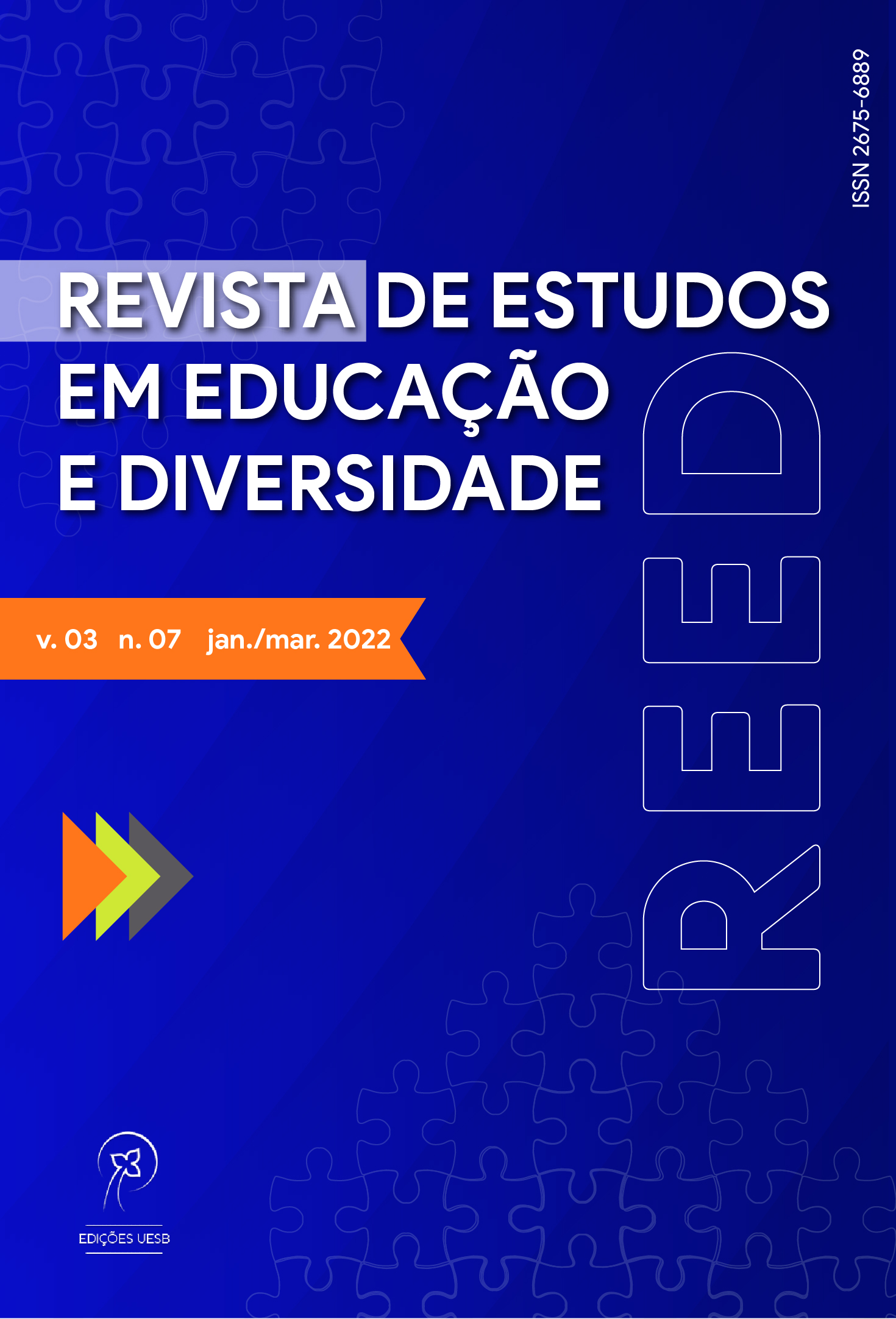PROMOTE THE DEVELOPMENT OF CHEMICAL SCIENTIFIC THINKING BASED ON DIDACTIC MODELS AS MEDIATORS IN THE LEARNING OF CHEMICAL EQUILIBRIUM.
DOI:
https://doi.org/10.22481/reed.v3i7.10320Keywords:
Didactic Model, Chemical Change, Teaching PracticeAbstract
The analysis of the professional, practical, and basic knowledge that a teacher must use to design, validate, and execute a didactic strategy, with the purpose of teaching a chemical concept structuring the conceptual corpus of chemistry, led to propose modeling as a strategy for teaching "Chemical Change", aiming at improving the learning of tenth grade students, basing the structuring of the proposal on the theoretical formulations of the didactics of chemistry. The intervention strategy was designed and validated based on scientific-school modeling, which made it possible to determine and compare the tenth-grade students' interpretations of the scientific model of chemical change. The students had to analyze several daily phenomena, prioritizing, within the strategy, the competences of collaborative work, creativity, observation, inquiry, and argumentation. The results show difficulties of the students, referred to the microscopic interpretations of matter. The didactic resources used by the teacher show conceptual errors regarding theories and previous and fundamental concepts for the understanding of the concept. It is concluded that chemistry didactics should be strengthened, research in chemistry education and rethink the teaching strategies of this science.
Downloads
References
BORSESE, A.; ESTEBAN, S.; TREJO, L. M. Estudio de los cambios químicos a través de fenómenos cotidianos. In: Cañón, G. P. (org.). Didáctica de la Química y Vida Cotidiana, Madrid: Sección de Publicaciones de la E.T.S. de Ingenieros Industriales, 2003. p. 25-32.
ETKINA, E. Conocimiento pedagógico de contenido y formación de profesores de secundaria. In: ANDRADE, A. M. et al. Miradas contemporáneas en educación. Bogotá: Universidad Distrital Francisco José de Caldas, 2013. p. 69-88. Disponible en: https://die.udistrital.edu.co/sites/default/files/doctorado_ud/publicaciones/miradas_contemporaneas_en_educacion.pdf. Acessado en: 22 mar. 2022.
GARZUZI, Viviana; MAFAUAD, Magali. Estilos y estrategias de aprendizaje en alumnos universitarios. Revista de orientación educacional, v. 28, n. 54, p. 71-96, 2014. Disponible en: https://dialnet.unirioja.es/servlet/articulo?codigo=5506383. Acessado en: 30 jun. 2021.
GARRITZ, A.; RAVIOLO, A.; SOSA, P. Sustancia y reacción química como conceptos centrales en química. Una discusión conceptual, histórica y didáctica. Revista Eureka sobre Enseñanza y Divulgación de las Ciencias. v. 8, n. 3, p. 240-254, 2011. Disponible en: https://revistas.uca.es/index.php/eureka/article/view/2714. Acessado en: 30 jan. 2022.
GARRITZ, A.; TRINIDAD-VELASCO, R. El conocimiento pedagógico del contenido. Educación Química, v. 15, n. 2, p. 2–6, 2004. Disponible en: http://garritz.com/andoni_garritz_ruiz/documentos/edit_cpc.pdf. Acessado en: 10 fev. 2022.
GILBERT, J. K. On the Nature of “Context” in Chemical Education. International Journal of Science Education, v. 28, n. 9, p. 957-976. 2006. Disponible en: https://doi.org/10.1080/09500690600702470. Acessado em: 24 de mar. 2022
JUSTI, R.; FIGUEIRÊDO, K. L. Conocimiento pedagógico de contenido (pck) de profesores sobre modelización. In: MERINO, C.; ARELLANO, M.; ADÚRIZ-BRAVO, A. (eds.) Avances en Didáctica de la Química: Modelos y lenguajes, Valparaíso: Ediciones Universitarias de Valparaíso, p. 63-78 2014.
LÓPEZ-MOTA, Á. D., & RODRÍGUEZ-PINEDA, D. P. (2013). Anclaje de los modelos y la modelización científica en estrategias didácticas. Enseñanza de las ciencias: revista de investigación y experiencias didácticas, v. 1, n. extra, p. 2008-2013. Disponible en: https://raco.cat/index.php/Ensenanza/article/view/307675. Acessado em: 20 mar. 2022.
MARCELO, C. La investigación sobre el conocimiento de los profesores y el proceso de aprender a enseñar. In: PERAFÁN, G.; ADÚRIZ-BRAVO, A. (eds.). Pensamiento y Conocimiento de los profesores: Debate y perspectivas internacionales. Bogotá: Universidad Pedagógica Nacional, 2005.
MEJÍA, M. I.; GARZUZI, V. Estrategias de aprendizaje sugeridas a partir de estilos de aprendizaje identificados. Revista de Orientación Educacional, v. 29, n. 55, p. 69-86, 2015. Disponible en: http://www.roe.cl/index.php/roe/article/view/61. Acessado em: 02 out. 2020.
MUÑOZ, M.; GARAY, F. La investigación como forma de desarrollo profesional docente: Retos y perspectivas. Estudios pedagógicos (Valdivia), v. 41, n. 2, p. 389-399, 2015. Disponible en: https://www.scielo.cl/scielo.php?script=sci_arttext&pid=S0718-07052015000200023. Acessado em: 02 fev. 2022.
NAVARRO, M. Cómo diagnosticar y mejorar los estilos de aprendizaje. España: Procompal Publicaciones. 2008
SALAS, S. R, E. Estilos de aprendizaje a la luz de la neurociencia. Bogotá: Cooperativa Editorial Magisterio, 2008
TALANQUER, V. Formación docente: ¿Qué conocimiento distingue a los buenos maestros de química? Educación química, v. 15, n. 1, p. 52-58, 2004. Disponible en: http://dx.doi.org/10.22201/fq.18708404e.2004.1.66216. Acessado em 21 jan. 2022.
VALBUENA, E. El Conocimiento Didáctico Del Contenido Biológico: Estudio de las Concepciones Disciplinares y Didácticas de Futuros Docentes de la Universidad Pedagógica Nacional (Colombia). 2007. Tese (Doctorado en Educación) - Universidad Complutense de Madrid, Madrid, 2007.
VENTURA, A. C. Estilos de aprendizaje y prácticas de enseñanza en la universidad: Un binomio que sustenta la calidad educativa. Perfiles educativos, v. 33, p. 142-154, ene. 2011. Disponible en: http://www.scielo.org.mx/scielo.php?script=sci_arttext&pid=S0185-26982011000500013. Acessado em 24 mar. 2022.
Downloads
Published
How to Cite
Issue
Section
License
Copyright (c) 2022 Revista de Estudos em Educação e Diversidade - REED

This work is licensed under a Creative Commons Attribution 4.0 International License.
You are free to:
Share - copy and redistribute the material in any medium or format; Adapt - remix, transform, and build from the material for any purpose, even commercially. This license is acceptable for Free Cultural Works. The licensor cannot revoke these freedoms as long as you follow the terms of the license.
Under the following terms:
Attribution - You must appropriately give credit, provide a link to the license, and indicate if any changes have been made. You may do so in any reasonable way, but not in a way that suggests that you or your use is endorsed by the licensor.
There are no additional restrictions - You cannot apply legal terms or technological measures that legally restrict others to make any use permitted by the license.






